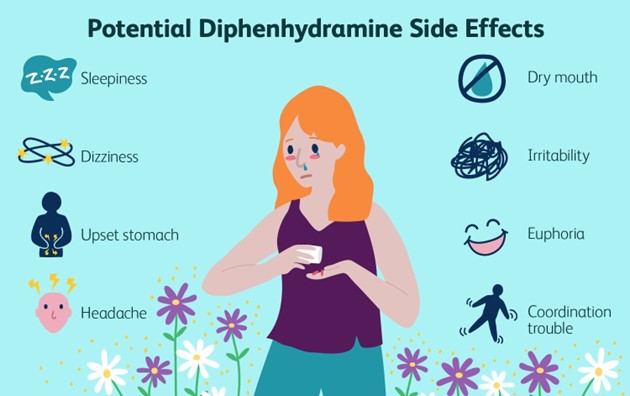Fluticasone (Flonase) a nasal glucocorticoid has been prescribed for a client with allergic rhinitis. The nurse teaches the client which is the most common side effect of continuous use.
Dry nasal mucosa and nosebleeds
Rhinorrhea
Dizziness
Hallucinations
The Correct Answer is A
Nasal glucocorticoids are commonly used to treat allergic rhinitis and work by reducing inflammation in the nasal passages. However, one of the potential side effects of using these medications is the drying of the nasal mucosa, which can lead to discomfort and occasional nosebleeds. It is important for clients to be aware of this side effect and to take appropriate measures to mitigate it, such as using a humidifier, staying hydrated, and gently applying a saline nasal spray if needed.
Rhinorrhea refers to a runny nose and is not a common side effect of fluticasone or other nasal glucocorticoids. Dizziness and hallucinations are also not typical side effects associated with the use of fluticasone. However, it is important to note that individual responses to medications can vary, and if a client experiences any unusual or concerning side effects while taking fluticasone, they should consult their healthcare provider for further evaluation.
Nursing Test Bank
Naxlex Comprehensive Predictor Exams
Related Questions
Correct Answer is D
Explanation
Dry mouth is a common side effect of diphenhydramine, which is an antihistamine medication commonly used to relieve symptoms of allergies, including itching and rash. Chewing on sugarless gum or sucking on hard, sour candies can help stimulate saliva production and alleviate the discomfort of dry mouth.

A. "Administer the medication with food": While taking diphenhydramine with food may help reduce the risk of stomach upset, it does not directly address the dry mouth side effect.
B. "Discontinue the medication and notify your provider": Discontinuing the medication without consulting the healthcare provider is not recommended unless specifically instructed to do so. Dry mouth is a common side effect of diphenhydramine and can be managed with supportive measures.
C. "Place a humidifier at your bedside every evening": While using a humidifier can help add moisture to the air and potentially alleviate dryness in the environment, it is not a specific instruction for managing dry mouth caused by diphenhydramine.
Correct Answer is B
Explanation
During an acute asthma attack, the airways become narrowed and inflamed, leading to symptoms such as wheezing, shortness of breath, and chest tightness. Short-acting beta2 agonists like Albuterol are the first-line medication for relieving acute asthma symptoms. They work by quickly relaxing the smooth muscles in the airways, resulting in bronchodilation and improved airflow. Albuterol provides rapid relief of symptoms and is often administered via inhalation.
A. Long-acting beta2 agonists (e.g., salmeterol) are typically used as maintenance therapy for long-term control of asthma symptoms, rather than for immediate relief during an acute attack.
C. Corticosteroids (e.g., fluticasone) are anti-inflammatory medications that are often prescribed for asthma, but they are more commonly used as part of a long-term management plan and may not provide immediate relief during an acute attack.
D. Anticholinergics (e.g., ipratropium) are sometimes used in combination with short-acting beta2 agonists for acute asthma exacerbations, but they are not typically the initial treatment choice for an acute asthma attack.
Whether you are a student looking to ace your exams or a practicing nurse seeking to enhance your expertise , our nursing education contents will empower you with the confidence and competence to make a difference in the lives of patients and become a respected leader in the healthcare field.
Visit Naxlex, invest in your future and unlock endless possibilities with our unparalleled nursing education contents today
Report Wrong Answer on the Current Question
Do you disagree with the answer? If yes, what is your expected answer? Explain.
Kindly be descriptive with the issue you are facing.
